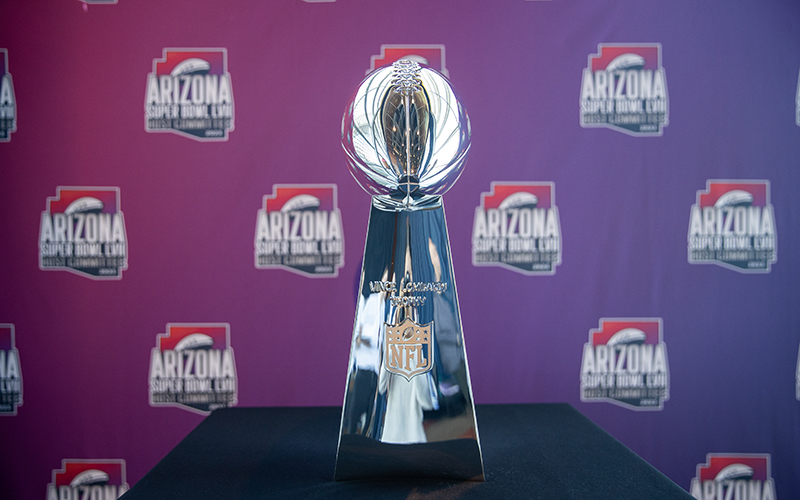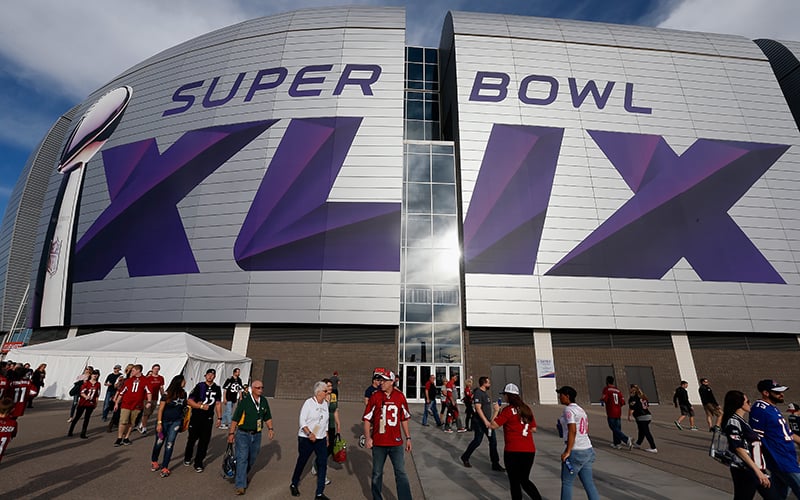PHOENIX – Although Super Bowl LVII is just three months away, concern remains that the event could be affected if Kari Lake is elected governor.
In a recent interview with KAZT-TV, the Republican nominee for Arizona governor declared her intentions to militarize Arizona’s border with Mexico – listed as one of the primary sources of fentanyl trafficking by the DEA in a 2020 report – upon her inauguration if she defeats Democratic opponent Katie Hobbs in the Nov. 8 election.
Lake’s policy could cause uneasiness among NFL leadership, who have pulled the Super Bowl from Arizona before over controversial political issues. However, ruffling the feathers of billionaire franchise owners is not a prospect that intimidates the Trump-endorsed politician.
“If the NFL wants to play chicken over the 2023 Super Bowl, I can promise you that I win that game,” Lake said in a tweet.
In 1990, Arizona voters failed to recognize Martin Luther King Jr. Day as a paid holiday. The NFL commissioner at the time, Paul Tagliabue, was under the assumption the conflict would resolve itself. When the proposition lost on a 75% majority, Tagliabue quickly promised the day after the result to strip the state of the big game.
At a private NFL owners’ meeting four months later, Tagliabue remained adamant about his decision.
“We should remove the game from political controversy and avoid being made a target,” Tagliabue told the Chicago Tribune in March of 1991. “So long as it is in Arizona and the alleged controversy is unresolved, people will reach out and use us as a target.”
NFL owners eventually chose to move the 1993 Super Bowl location from Sun Devil Stadium (the original home venue of the Arizona Cardinals) to the Rose Bowl in Pasadena, California. The New York Times estimated the economic loss to be upwards of $200 million.
MLK day was placed on the ballot again in 1992 and received 62 percent of voter approval, paving the way for Arizona to host the 1996 Super Bowl as a compromise.
“We can’t go through it again,” said Fran Simons, 52, who was in line to cast a ballot at a Scottsdale voting site early Tuesday morning. “I think the time frame is probably too short for the NFL to do anything, but doesn’t she see what an embarrassment her policies are?”
Lake does not intend to change her stance if the NFL rebukes. Her fentanyl control measures could be set in motion once she takes office – a month before the most-watched annual sporting event in the world.
“I’m not going to be taking marching orders from the NFL,” Lake said. “I’m going to be taking marching orders from the people of Arizona who are tired of their children getting their hands on the deadliest drug this country has ever seen.”
Fentanyl, a synthetic opioid 50 to 100 times more potent than morphine, is listed among the most common drugs related to overdose deaths. According to Centers for Disease Control and Prevention data from 2020, fentanyl accounted for 1,108 deaths among Arizona adults aged 18 to 45 years old – the second-highest leading cause of death behind accidents.
Additionally, the 2015 Super Bowl hosted in Glendale generated a whopping $720 million of economic impact for the Phoenix metro area, according to a study by the W.P. Carey School of Business. That was up by 30% from the 2008 Super Bowl, which drew in $500 million.
Lake said she values the lives lost to the drug over the potential economic boon the Super Bowl would bring to the Valley.
“If the NFL has a problem with that, they’re going to have to lick their wounds because we are going to secure our border in Arizona,” Lake said.
The site of the Super Bowl was met with opposition earlier in 2022. Over 200 faith leaders, 36 of which live in Arizona, signed a petition in February to move the football championship over bills (SB 1003 and SB1485) they identified as acts of voter suppression.
“As the NFL has recently considered relocating Super Bowl LVII because of COVID-19, we, as faith leaders, ask you to consider relocating Super Bowl LVII from Arizona because of another disease: the disease of racism, and particularly, its symptom of voter suppression,” the petition said.
In a statement responding to the petition, Gov. Doug Ducey said it was “unfathomable why anyone would want to deny Arizona these benefits and this opportunity.”
The NFL and Arizona Super Bowl Host Committee did not respond to requests for an interview.



